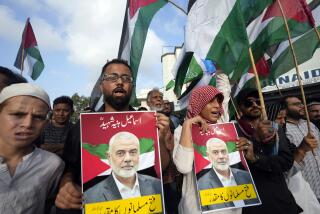Shamir Rebuked by U.S. Over Deaths of 7 Palestinians : Diplomacy: His rejection of peace plan contributed to the ‘potential for senseless violence,’ Washington says.
- Share via
WASHINGTON — The Bush Administration, in a stinging rebuke to Israel’s embattled caretaker government, said Prime Minister Yitzhak Shamir must share the blame for the massacre of seven Arab workers and the rioting that followed because his rebuff of a U.S.-backed peace initiative contributed to the “potential . . . for senseless violence.”
State Department spokesman Richard Boucher accepted Israel’s explanation that the killings at a highway crossroads near the Israeli town of Rishon le Zion were the work of a mentally unbalanced man. But he said that does not relieve the Israeli government of responsibility for the murders and the violence that followed.
“In the absence of the peace process, the potential for this kind of senseless violence and spiraling responses afterwards goes up,” Boucher said, reading from a statement.
Also, Boucher criticized the Israeli army for inflicting an excessive number of casualties in its effort to put down the violence that followed word of the shootings.
“When you have this kind of very horrible, very tragic sort of incident, and then that’s followed by responses that lead to further violence, we see that as another sign that there must be a peace process and people have to be able to believe in a peace process,” Boucher said.
Asked if he would join Israeli government leaders in urging Arab governments and Palestinian activists to refrain from exploiting the killings to incite further violence, Boucher said Washington “calls on all sides to make an effort to reduce tensions.” But he immediately turned back to his criticism of Israel.
“It is not merely enough to have restraint,” he said. “We need an active, viable peace process to create hope for the future.”
Shamir had balked at a peace plan advanced by Secretary of State James A. Baker III that was designed to lead to negotiations between Israel and Palestinians.
As a consequence, the Labor Party, which supported the Baker initiative, pulled out of Israel’s national unity government in March and brought it down. However, since then, no party has been able to put together a majority in Parliament, so Shamir has continued to lead a caretaker regime.
U.S.-Israeli friction over Shamir’s refusal to go along with Baker’s plan has driven the relationship between the traditional allies to the lowest point in at least a generation. Boucher’s statement Monday is sure to cause additional tension.
The Israeli government launched a major public relations campaign Monday. It directed its embassies around the world to explain its policies in the occupied West Bank and Gaza Strip and to assure the world that the government did not condone the Rishon le Zion killings.
However, Boucher responded by renewing U.S. criticism of the Israeli army for its use of force in trying to put down the Palestinian uprising.
“We’re disturbed by the number of casualties inflicted by the Israeli army,” he said. “We’ve repeatedly called upon the government of Israel to exercise restraint in these situations in order to avoid heavy casualties such as took place (Sunday).”
By contrast, Boucher praised the government of Jordan for its handling of a Palestinian gunman who sprayed a busload of French tourists with bullets after shouting slogans of revenge for the Arabs killed in Rishon le Zion.
“We deplore this tragic incident and extend our sympathies to the wounded and their families,” Boucher said. “The Jordanian authorities have acted quickly to contain the incident, and we understand they are taking steps to ensure the security of foreign tourists and others visiting Jordan.”
More to Read
Sign up for Essential California
The most important California stories and recommendations in your inbox every morning.
You may occasionally receive promotional content from the Los Angeles Times.













